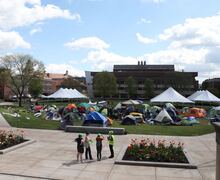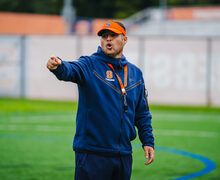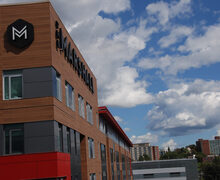Transportation, on-campus housing at the forefront during SA’s latest town hall
Leanne Rivera | Staff Photographer
At Student Association’s second Town Hall of the semester, President David Bruen and SA Comptroller-elect Dylan France discussed on-campus housing affordability, sustainability and tuition. The students’ concern will be compiled into a report for the Board of Trustees.
Get the latest Syracuse news delivered right to your inbox.
Subscribe to our newsletter here.
Syracuse University’s Student Association hosted its second town hall of the semester on Wednesday evening to discuss issues like on-campus housing affordability, university sustainability goals and the range of tuition’s academic coverage at SU.
SA President David Bruen and SA Comptroller-elect Dylan France — both of whom currently serve as undergraduate student representatives on SU’s Board of Trustees — must draft and submit a spring semester report to the board by April 21. SA’s first town hall meeting of the semester on March 28 covered similar campus issues.
Bruen said it’s imperative to report students’ concerns to the Board of Trustees because of its power to control campus activity and the operation of SU’s respective departments.
“The board is basically the only body that’s really required to exist at the university, and then everything flows from them,” Bruen said. “They create — in conjunction with the chancellor and administration — the educational mission and the fiscal policies of the university.”
Several students expressed concern over the current shortage of SU’s trolley drivers. On April 6, SU’s Office of Parking and Transportation Services announced delays and cancellations for the university’s Blue and Orange trolley loops for the rest of the semester as a result of the shortage.
Bruen attributed the deficiency to the COVID-19 pandemic, which previously impacted the university’s transportation services via the Centro bus system, and pointed to alternate forms of transportation.
The city of Syracuse is one of the most popular locations for Veo, an electric scooter and bike rideshare service, but it doesn’t operate on SU’s campus because it hasn’t established an official agreement with the university. Bruen said the disconnect makes it harder for students to access Veo and for company officials to monitor activity for safety.
Bruen said a partnership between Veo and SU, with the condition of regulations like vehicle speed limits, would allow the scooters and bikes to be available on campus and benefit students looking for affordable and sustainable transportation options.
Students also discussed what an “ideal” residence hall should look like. After several attendees discussed quality issues with current on-campus housing and a lack of noticeable renovations in established residential halls, the group called for improvements like increased accessibility for people with disabilities and more laundry rooms.
SA representative Adam Baltaxe pointed to the Psi Upsilon fraternity chapter’s house, located between Watson Hall and the Life Sciences complex, as an optimal place for a future residence hall to be built because of its proximity to main campus.
Students also brought up concerns about dorm appliance quality and housing prices. SA representative Aidan O’Connell said the fact that many students end up on South Campus is unfair, because South Campus housing costs more than North Campus housing.
Yasmin Nayrouz, Vice President of University Affairs, added that affordable housing should be prioritized for sophomores, not just freshmen. As a result of over-enrollment, nearly 200 sophomores were relocated after initial housing selections for the fall 2022 semester.
In terms of SU’s costs, one attendee said lab fees and textbooks for classes should be included in tuition. France said campus bookstores and libraries are separate businesses from the university, which poses an issue as to who would support students for these expenses.
Regarding campus sustainability efforts, France highlighted SA’s Carbon Neutrality Referendum that called for SU to shift its carbon neutrality goal from 2040 to 2030. During SA’s spring election, nearly 93% of participating students voted to support the referendum.
Bruen said SA will release further sustainability progress updates “very soon.” SA’s final cumulative report of student feedback will be recorded and communicated to the Board of Trustees in May to encourage changes in the coming year, he said.
Published on April 13, 2023 at 12:59 am





